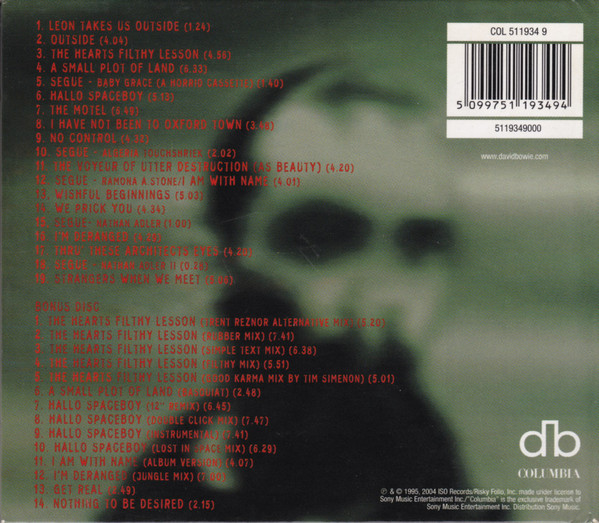David Bowie: 1. Outside - 1995
"We both liked that album a lot and felt that it had fallen through the cracks" - Brian Eno
Quite how Hallo Spaceboy, a crazed dance beat song with spacey overtones, fits in with the album's concept is unclear. It seems completely incongruous to me. Well, basically, it doesn't. It did make for a catchy, dancey single however that got a fair amount of radio play at the time.


David Bowie was back with old mate, producer Brian Eno, for this one. It was released two years after the vaguely experimental Black Tie White Noise and it ploughed several new furrows - dance music, spoken interludes, electronica, post grunge and even more avant garde, piano-driven jazz than had been dabbled with on the previous album.
It has, supposedly, a "concept" about a detective investigating the horrific murder and dismembering of a fourteen year-old girl. All rather unsettling and frankly a bit odd. It features several characters and, in between the songs, has several short, often spoken pieces. The one called Baby Grace I actually don't ever play, finding it decidedly creepy.
So, I just stick to the songs, leaving out the spoken interludes and, playing them thus, the "concept" fades away. Did I really care about these characters anyway? No. The songs can all be taken separately, at face value. Yes, I know it is supposed to be listened to in its original incarnation, but well, there you go, I don't. Am I "cheating" the concept? Bowie purists would undoubtedly say yes. Bowie himself said that the album was intended to be post-apocalyptic in a slightly Diamond Dogs fashion as the end of the century approached, something about which Bowie seemed to have become increasingly afraid of.
Outside is a solemn, intense but sonically addictive song, with a really strong Bowie vocal and a great sound to it. Lots of searing guitar, keyboards and a slow, industrial drum beat. I had forgotten what a good opener it was. It is easily one of the album's best songs.
Heart's Filthy Lesson introduces us to Bowie's dance beat experimentation that would continue into 1997's Earthling album. Beneath the thumping beat lies some madcap Mike Garson piano, some delicious rhythms, backing vocals and some haughty Bowie vocals coming in here and there. It is an innovatory and interesting track, up there with Outside at the top of the album's list of quality numbers. Similarly so is the avant-garde jazz of A Small Plot Of Land, with old Ziggy-era pianist Mike Garson to the fore. It is a most unusual track with some beguiling rhythms, cutting Talking Heads-style guitar and oddly distant but sonorous vocals floating around from Bowie. It is one of his strangest songs.
The Motel is a haunting, ethereal number with some more sumptuous Mike Garson piano, some absolutely killer Reeves Gabrels guitar and some echoes of the future in how some of the Blackstar album would sound in places. That whole futuristic jazz thing. I Have Not Been To Oxford Town has Bowie narrating part of the album's concept in full actor mode, semi-singing over an insistent but highly captivating guitar-driven industrial rhythm. It is similar to the feel of Something off Lodger. Red Money, that's it.
No Control has a slow-burning, walking pace techno-influenced dance-ish beat and a typically arch Bowie vocal. He is trying to show those Pet Shop Boys a thing or two. He can still change with the times. The Voyeur Of Utter Destruction has some Aladdin Sane-style piano over another thumping dance beat. Dance rhythms are getting increasingly common as the album progresses, a signpost for the next album. I Am With Name is a bizarre, cacophonous piece of jazzy experimentation that doesn't lend itself to too many listens, to be honest. It is part of a segue that I often skip over or leave out, to be honest.
Wishful Beginnings has a sledgehammer single beat drum sound that goes right to one's centre. It is a slightly unnerving but infectious song. All very enigmatic. We Prick You has the frantic, synthesised dance beat back again, but it features some excellent keyboard and guitar sounds too and an energising vocal. I'm Deranged just washes over you in a swathe of dance beats and occasionally tinkling piano with a somewhat airy, distant vocal.
Thru' These Architect's Eyes is one of the album's best tracks, however. It has a rumbling bass line, great guitar riffs, yet more wonderful piano and Bowie powerfully incanting out the perplexing lyrics.
Finally, (and this has been Bowie's longest ever album), we get the most conventionally-played number, Strangers When We Meet. It has an introductory riff vaguely reminiscent of Spencer Davis's Gimme Some Lovin'. It is probably my favourite on the album. It has a great hook, catchy melody and thankfully, no dance rhythms! A "proper" Bowie song - at last.
These last two songs have been good ones, but, I have to admit, although the album is somewhat stodgy, it does indeed merit many listens. There is much beneath the surface. That is the mark of a good David Bowie album, I guess. Incidentally, the extended double disc edition of the album contains endless remixes of some of the tracks - five versions of Hearts Filthy Lesson, for example. It is a labour of love trawling through them all, but some of them are pretty good and sometimes superior to the one used on the actual album. I particularly like the bassy Rubber Mix of Heart's Filthy Lesson.
Interestingly, Brian Eno spoke one week after Bowie's death thus -
"....About a year ago we started talking about Outside – the last album we worked on together. We both liked that album a lot and felt that it had fallen through the cracks. We talked about revisiting it, taking it somewhere new. I was looking forward to that...."
What a shame it never came to pass.











